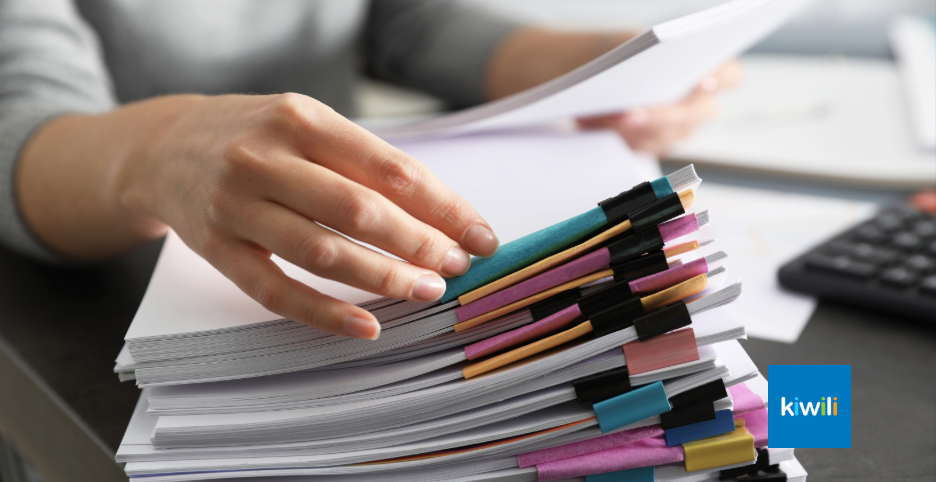From an accounting perspective, being a micro-entrepreneur (aka being self-employed or a freelance), has many advantages. Micro-entrepreneurs benefit from a reduced tax and accounting system. This avoids, for instance, having to submit an annual balance sheet at the end of each financial year. Micro-entrepreneurs do however have other requirements that they need to comply with.
New to the world of accounting? Overwhelmed by all the paperwork? We’ve summarized exactly what paperwork you need to submit as a micro-entrepreneur, and some pearls of wisdom for you to keep in mind.
The 7 Golden Rules
1) Thou shalt keep a book of receipts
As a micro-entrepreneur, like any other business owner, you have to justify your spending or expenditure in a document called the general ledger. The general ledger summarizes and provides evidence of all your business expenses. It forms the basis for all business accounting. It is a chronological record, which must be maintained daily.
For every receipt, you must log :
- The date of the sale or service
- The corresponding invoice number and details of any supporting documents
- The amount of the receipt
- The client’s name
- The type of expense being recorded (expense category)
- The payment method (cheque, cash, etc.)
We recommend using a simple accounting software such as Kiwili to automate these procedures, as they can become time-consuming when done manually.
2) Thou shalt meet invoicing standards
It is mandatory to save the invoices for each service provided and every receipt. You need to provide your clients with an invoice after each sale or service provided.
All of the invoices and supporting documents regarding the purchase and sale of products or services carried out are required to list some essential details and must be stored beyond the financial year end.
Our latest post might be of interest, 4 easy steps to guide you create invoices online (with examples), it’s all about how you can create invoices online easily using cloud-based accounting and business management software.
3) Thou shalt record all transactions in the purchase log
If you engage in commercial activity, you need to keep a purchase log. It is mandatory if your business consists primarily of selling goods, service provisions, foodstuffs to be consumed on site or to take away, or accommodation services.
Listed in chronological order, just like the book of receipts, it must include:
- Payment method
- Details of any supporting documentation for each purchase
- Date of purchase
- Amount
- Origin of purchase (suppliers)
In addition to regulating your financial position, the purchase log helps you to monitor your commercial activity closely and deepen your understanding of your business.
4) Thou shalt open a business bank account
If you are a micro-entrepreneur, you must open a bank account for your professional activity no later than one year after registering your company. Your company account doesn’t necessarily have to be classed as a “business” bank account by the banks (this title being purely marketing), but it must be separate from your personal account. It will be reserved for the financial transactions made in connection with your work.
This account will enable you to :
- Debit your business expenses and purchases
- Record your revenue
- Set up direct debits for your pay/salary/wages, by cheque or bank transfer to your personal account
- Use payment methods in your company’s name (cheque book, card payments, etc.)
- Obtain credit or loans, etc.
5) Thou shalt store accounting documents
As a micro-entrepreneur, you are required to store all invoices and supporting documents relating to purchases and sales of goods or services provided. You need to store the entirety of your accounting documents (invoices, notes, purchase orders, etc.). You risk a tax adjustment or fine if you aren’t able to provide these documents in case of checks. You might be interested in our post all about storage deadlines for accounting documents, coming soon on Kiwili.
6) Thou shalt possess a policy book (if selling used goods)
In some countries, if you sell used goods, you must keep a policy book. The policy book is essentially to fight against receiving stolen goods. Also known as a register of moveable objects (ROM), it allows us to log our transactions and keep a record of where objects came from and their purchase price. Everyone who acquires or holds second-hand or used objects with the intention of selling them on to add value or make a profit must have a policy book. The book can be purchased in shops, and must be signed by the local police station or town hall.
The pages of a policy book are in the form of a table, which you must complete with the following information:
- A reference number
- Date object was acquired
- The origin of the purchase(s) with the supplier’s name and address (don’t forget to include supplier’s country of origin too)
- Object description: a description of the object, details of any distinguishable marks (serial number, signature)
- Release or resale date
The policy book can be checked by the authorities at any time. It must be stored somewhere that is easily accessible and kept up-to-date regularly. The policy book is impossible to forge or tamper-proof.
You can also use an electronic policy book, in the form of inventory software for example. This software doesn’t need any particular approval or authorization, but it must contain the information mentioned above and conform to regulations.
By law, you are required to register new entries daily. If you plan on using an electronic policy book, you must declare it to the National Commission on Informatics and Liberty.
7) Thou shalt pay thy taxes
It might seem obvious, but you mustn’t forget to pay your taxes each year!
All companies are taxed on their profits. Sole proprietorships, like micro-enterprises, are subject to tax on their income.
Entrepreneurs must declare their revenue monthly or quarterly (at their discretion). At the end of the financial year, in order to determine your tax base, you need to deduct the company’s actual expenses from their revenue. Depending on the type of work you do as a micro-entrepreneur, you may be able to take advantage of a standardized deduction allowance, which will reduce your revenue to declare. The profit is then integrated with the household income of the business owner.
Keeping your accounts in order as a micro-entrepreneur isn’t as complicated as people make out. Simply follow the commandments laid out in this article to keep on top of these requirements.
Using a business management software like Kiwili will allow you to speed up these procedures and centralize the management of your work to just one online platform. Check out our features and sign yourself up for our 14 days free trial.
Kiwili is an all-in-one business management software. It is at the same time an easy invoicing software, an accounting software, a CRM, a convenient project management tool and a time tracking software. Everything you need to manage your business like a pro!

